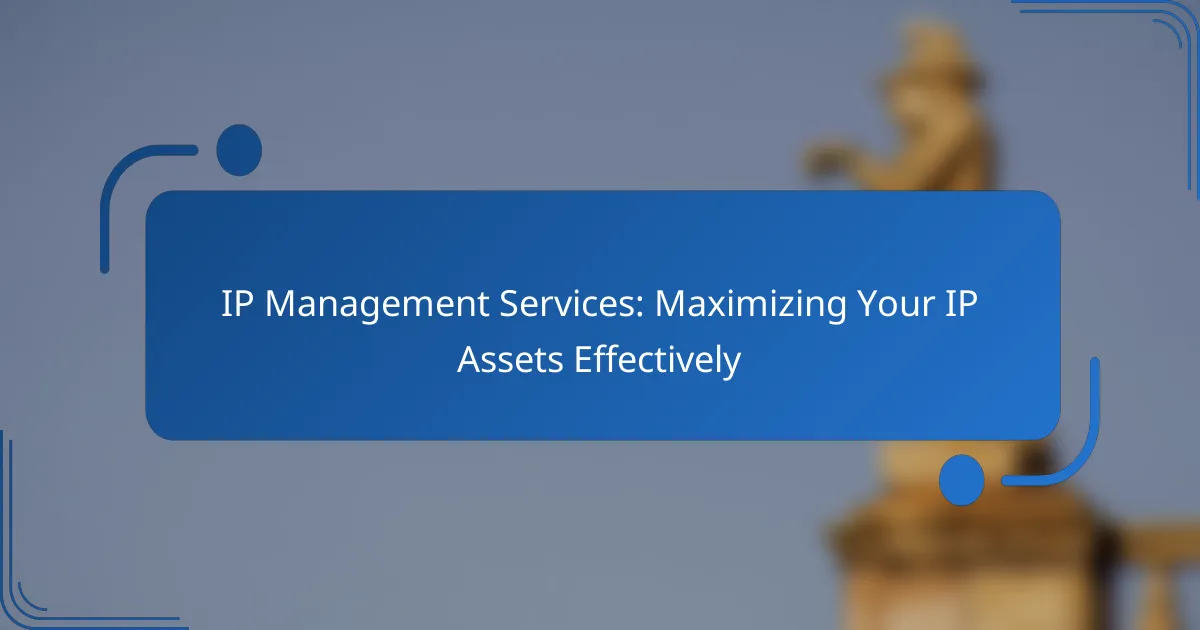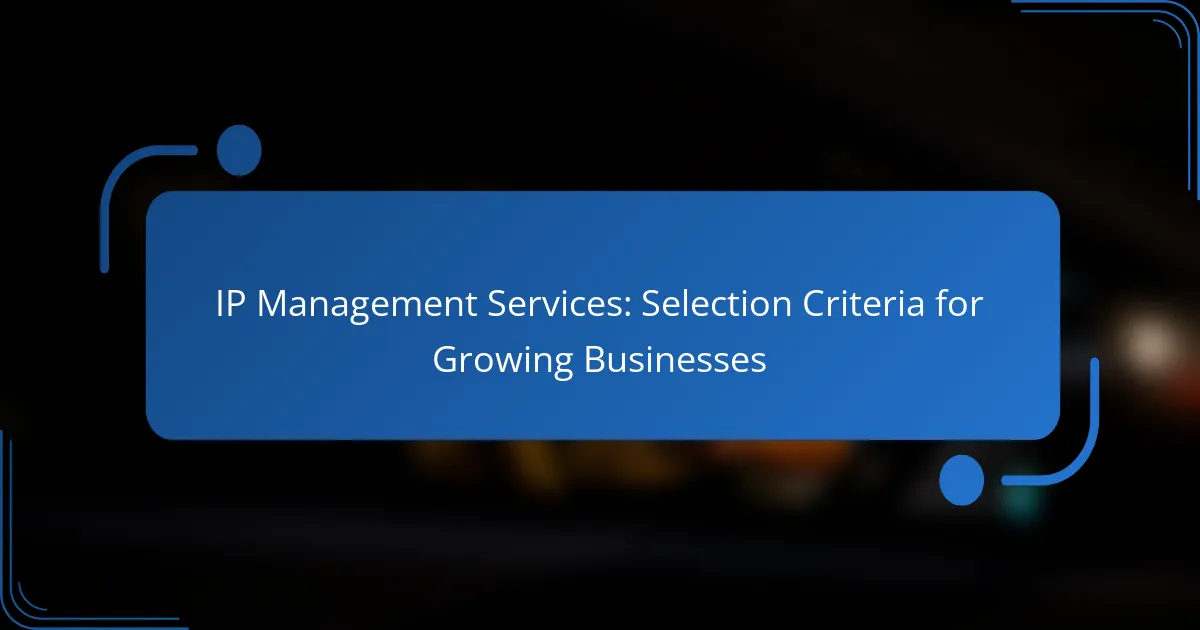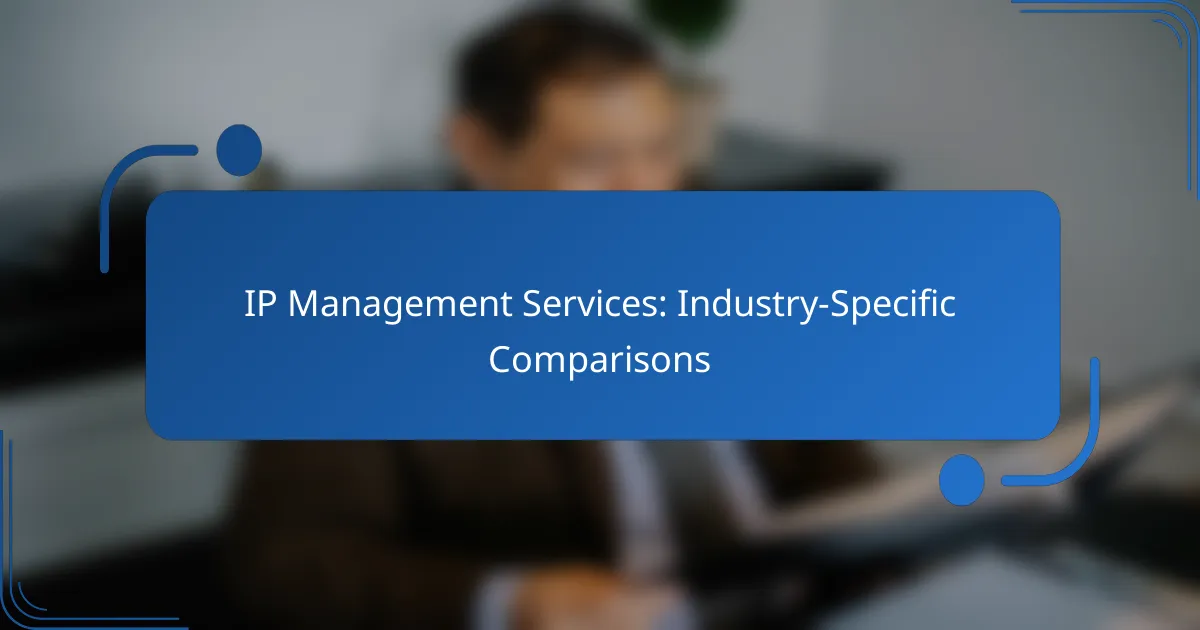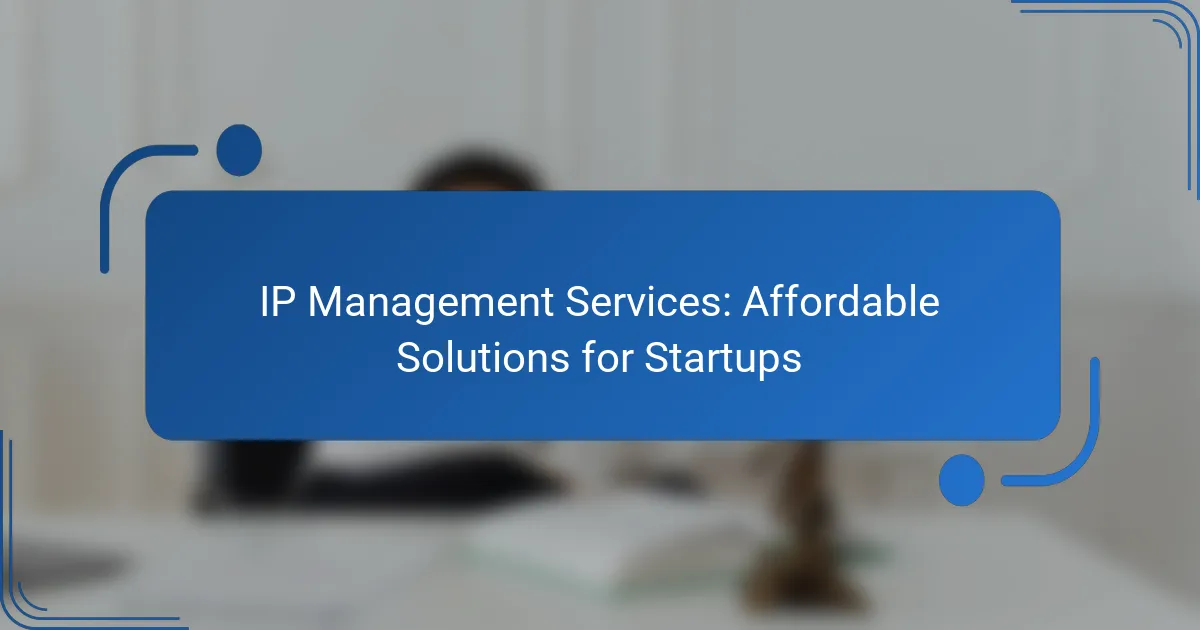IP management services play a crucial role in maximizing the value of your intellectual property assets by offering structured oversight and strategic planning. By effectively identifying, protecting, and leveraging IP, organizations can gain competitive advantages and drive revenue growth. These services enhance operational efficiency through centralized management, automated tracking, and comprehensive reporting tools, ensuring that your IP is managed for optimal value and compliance.
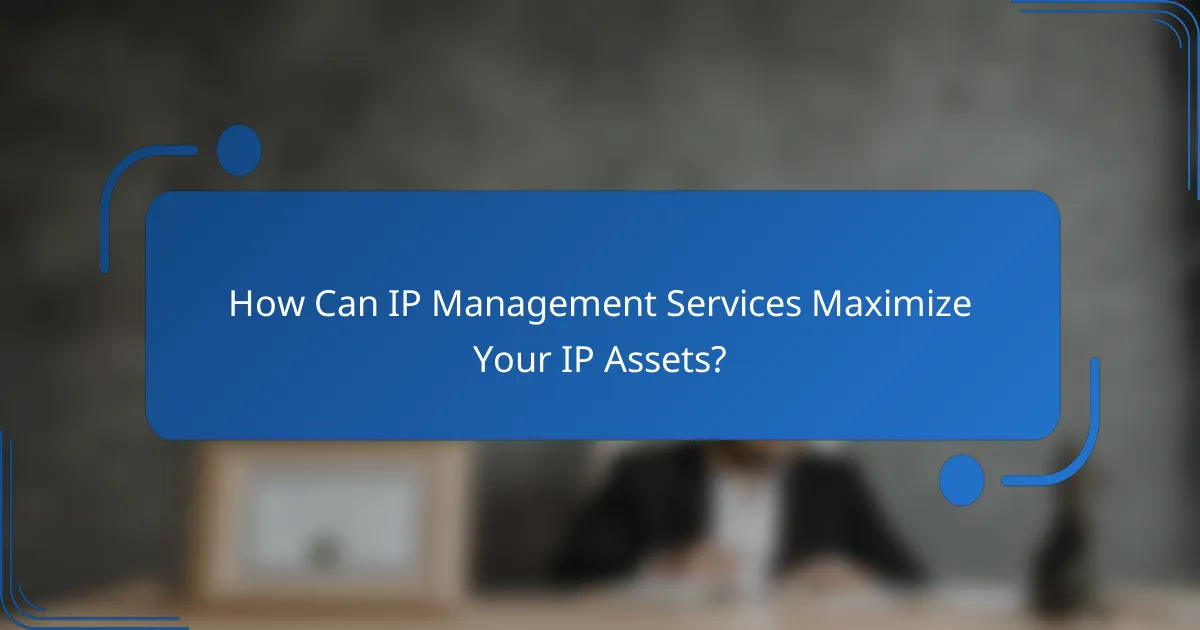
How Can IP Management Services Maximize Your IP Assets?
IP management services can significantly enhance the value of your intellectual property (IP) assets by providing structured oversight, strategic planning, and operational efficiency. These services help organizations identify, protect, and leverage their IP to achieve competitive advantages and drive revenue growth.
Enhanced asset visibility
Enhanced asset visibility allows businesses to have a clear overview of their IP portfolio, including patents, trademarks, and copyrights. This transparency aids in tracking asset performance and identifying underutilized IP that may be monetized or improved.
Utilizing IP management software can streamline this process, offering dashboards and reports that highlight key metrics. Regular audits can also ensure that all assets are accounted for and properly valued.
Improved compliance management
Improved compliance management ensures that organizations adhere to relevant laws and regulations regarding their IP. This includes monitoring deadlines for renewals, filings, and other legal requirements to avoid costly penalties.
Implementing automated reminders and compliance checklists can help maintain adherence to local and international IP laws, such as the Patent Cooperation Treaty (PCT) or the Madrid Protocol for trademarks.
Streamlined licensing processes
Streamlined licensing processes simplify the negotiation and execution of licensing agreements, making it easier to monetize IP assets. This can involve creating standardized contracts and templates that reduce negotiation time.
Additionally, leveraging digital platforms for licensing can facilitate quicker transactions and better tracking of licensing terms and royalties, ensuring that all parties fulfill their obligations efficiently.
Increased revenue generation
Increased revenue generation from IP assets can be achieved through effective management and strategic licensing. By identifying potential markets and partners, organizations can turn their IP into profitable ventures.
For instance, companies can license their technology to other businesses or collaborate on joint ventures, which can lead to significant financial returns. Regular market analysis can help identify new opportunities for monetization.
Risk mitigation strategies
Risk mitigation strategies are essential to protect IP assets from infringement and unauthorized use. This includes conducting regular risk assessments and implementing robust security measures to safeguard sensitive information.
Organizations should also consider insurance options for their IP assets, such as patent insurance, which can provide financial protection against litigation costs. Establishing clear internal policies on IP usage can further reduce risks associated with employee actions or third-party interactions.
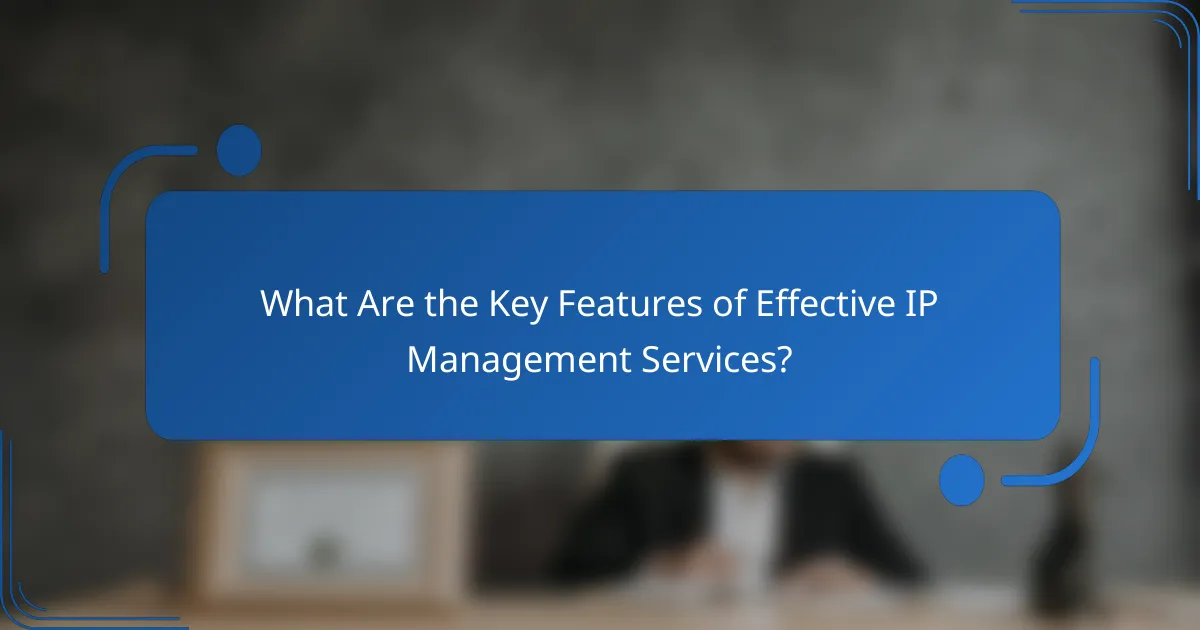
What Are the Key Features of Effective IP Management Services?
Effective IP management services streamline the administration of intellectual property assets, ensuring they are maximized for value and compliance. Key features include centralized management, automated tracking, and comprehensive reporting tools that enhance decision-making and operational efficiency.
Centralized IP portfolio management
Centralized IP portfolio management consolidates all intellectual property assets into a single system, allowing for easier oversight and strategic planning. This approach enables organizations to track the status of patents, trademarks, and copyrights in one place, reducing the risk of oversight.
Utilizing a centralized system can improve collaboration among teams, as stakeholders can access real-time data and updates. Consider adopting software solutions that integrate with existing business processes to enhance visibility and control over your IP assets.
Automated renewal tracking
Automated renewal tracking is essential for maintaining the validity of IP rights. This feature alerts users to upcoming deadlines for renewals, ensuring that valuable assets are not unintentionally abandoned due to missed dates.
Implementing automated systems can save time and reduce human error. For example, setting reminders for renewal dates at least 6 months in advance can provide ample time for necessary actions, helping to avoid costly lapses in protection.
Comprehensive reporting tools
Comprehensive reporting tools provide insights into the performance and status of IP assets, facilitating informed decision-making. These tools can generate reports on various metrics, such as renewal timelines, market trends, and potential infringement issues.
Utilizing these reporting capabilities allows organizations to identify opportunities for monetization or areas needing attention. Regularly reviewing reports can help prioritize IP management efforts and align them with business objectives, ensuring that resources are allocated effectively.
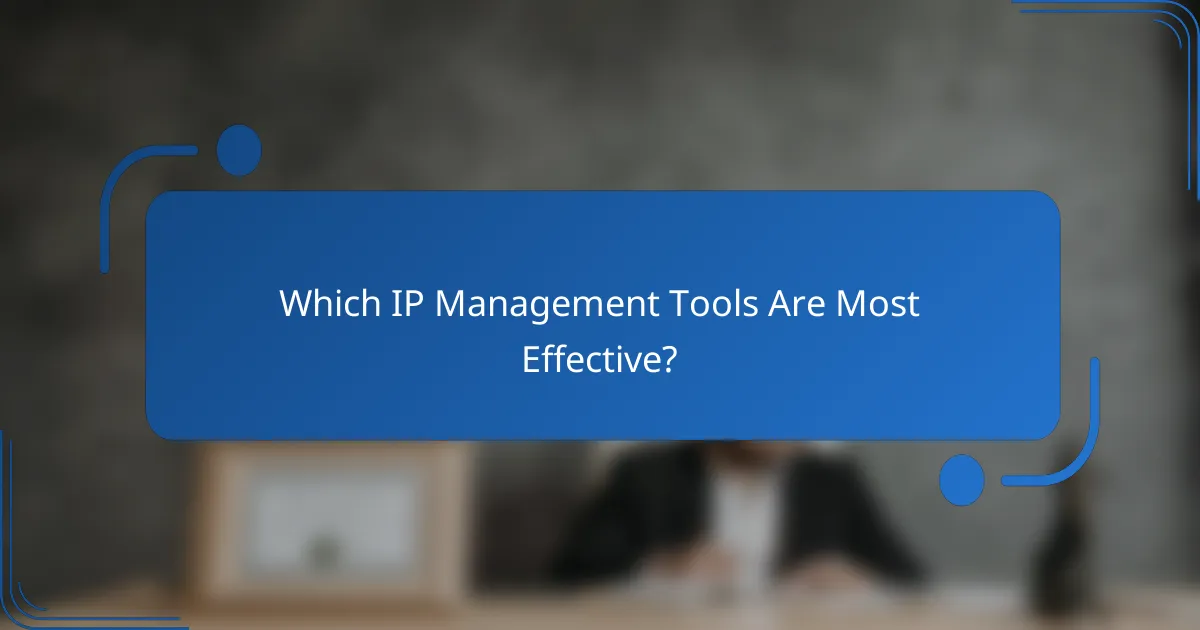
Which IP Management Tools Are Most Effective?
Effective IP management tools streamline the process of tracking, protecting, and maximizing intellectual property assets. The right choice depends on specific needs such as budget, functionality, and integration capabilities.
CPA Global
CPA Global offers a comprehensive suite of IP management solutions that cater to various industries. Its platform is designed to help organizations manage their IP portfolios efficiently, providing tools for tracking deadlines, renewals, and compliance with international regulations.
One of the key features is its analytics capability, which allows users to gain insights into their IP assets’ performance. This can help in making informed decisions regarding investments and strategies for IP development.
IPfolio
IPfolio is tailored for companies looking to manage their IP assets with a focus on usability and collaboration. It provides a user-friendly interface that simplifies the management of patents, trademarks, and copyrights.
With features like customizable dashboards and reporting tools, IPfolio enables teams to track their IP lifecycle effectively. This tool is particularly beneficial for startups and small businesses that need to maintain a clear overview of their IP without extensive resources.
PatSnap
PatSnap combines IP management with powerful analytics and research capabilities. It allows users to conduct competitive analysis and market research, making it easier to identify trends and opportunities in their respective fields.
This tool is especially useful for R&D departments, as it provides insights into patent landscapes and technological advancements. PatSnap’s ability to integrate with other business systems can enhance overall operational efficiency.
Anaqua
Anaqua is designed for large enterprises that require robust IP management solutions. It offers features for managing the entire IP lifecycle, including invention disclosures, prosecution, and maintenance.
Its strong focus on collaboration and integration with legal teams helps streamline workflows and improve communication. Anaqua also provides analytics tools that assist in strategic decision-making regarding IP investments and portfolio management.
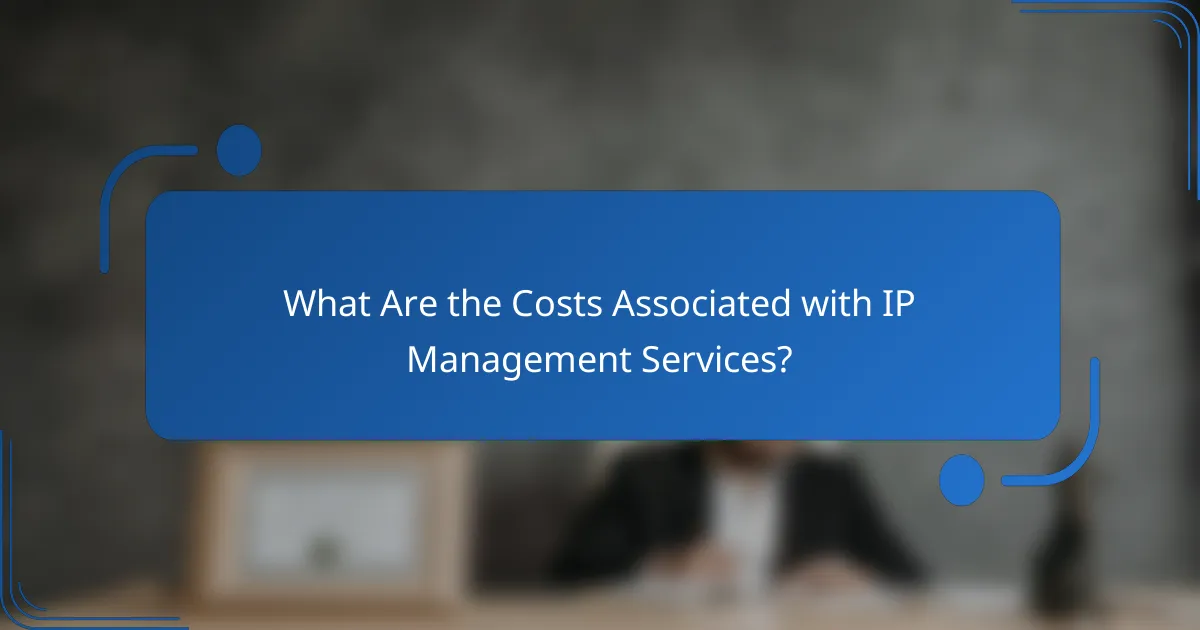
What Are the Costs Associated with IP Management Services?
The costs associated with IP management services can vary widely based on the complexity of your intellectual property portfolio and the services required. Generally, expenses can include service tier pricing, software solutions, and consultation fees, each contributing to the overall investment in managing your IP assets effectively.
Service tier pricing
Service tier pricing refers to the different levels of IP management services available, which can range from basic to comprehensive packages. Basic tiers may cost a few hundred to a couple of thousand USD annually, while premium tiers can exceed several thousand dollars, depending on the extent of services like monitoring, enforcement, and reporting.
When selecting a service tier, consider the specific needs of your IP portfolio. A smaller business may find a basic package sufficient, while larger enterprises with extensive IP assets might require a more robust solution.
Cost of software solutions
The cost of software solutions for IP management can vary significantly based on functionality and user capacity. Subscription-based software typically ranges from around 50 to several hundred USD per month, while one-time purchase options can range from a few thousand to tens of thousands of USD.
Evaluate the features offered by different software solutions, such as tracking capabilities, reporting tools, and integration with existing systems. Choosing the right software can streamline your IP management process and potentially save costs in the long run.
Consultation fees
Consultation fees for IP management services can vary based on the expertise of the consultant and the complexity of your needs. Hourly rates can range from 100 to over 500 USD, depending on the consultant’s experience and the market demand.
To optimize your investment in consultation, consider bundling services or seeking flat-rate packages for specific projects. This can provide clarity on costs and help avoid unexpected expenses while ensuring you receive expert guidance tailored to your IP strategy.
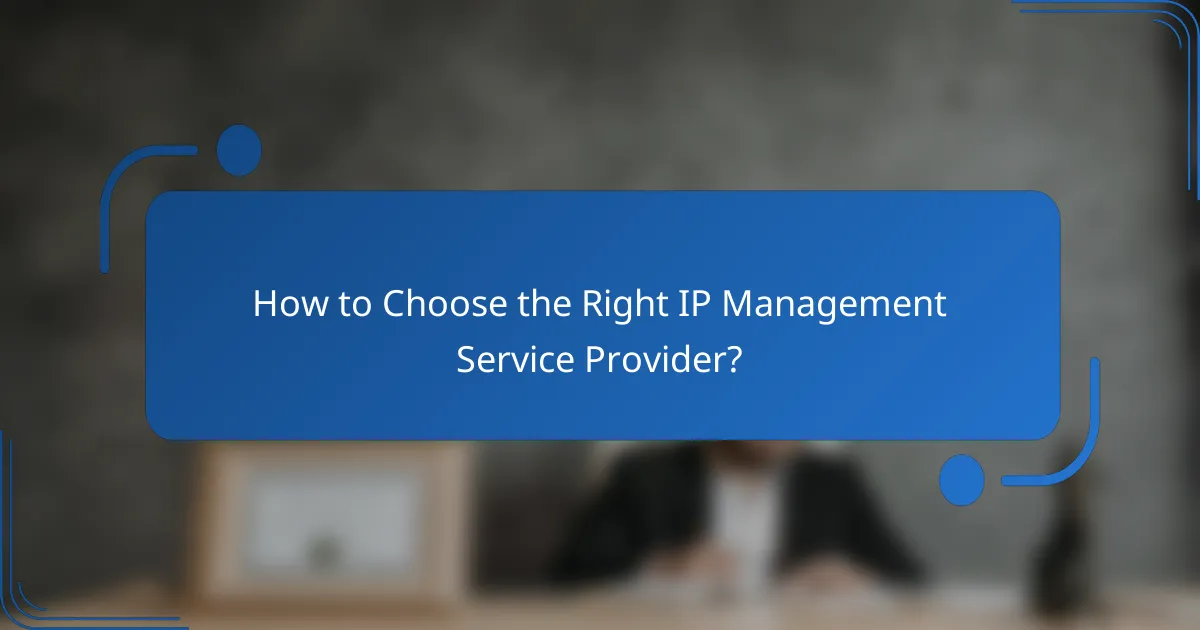
How to Choose the Right IP Management Service Provider?
Selecting the right IP management service provider is crucial for effectively maximizing your intellectual property assets. Consider factors such as experience, technology capabilities, and alignment with your specific needs to ensure you make an informed choice.
Evaluate provider experience
Assessing a provider’s experience involves looking at their track record in managing IP portfolios similar to yours. Check how long they have been in the industry and the types of clients they serve, as this can indicate their expertise and reliability.
Look for testimonials or case studies that highlight successful outcomes. A provider with experience in your specific industry or sector can offer tailored insights and strategies that align with your business goals.
Assess technology capabilities
Technology plays a vital role in IP management, so evaluate the tools and platforms the provider uses. Effective IP management software should offer features like automated tracking, reporting, and compliance monitoring to streamline your operations.
Consider whether the provider’s technology integrates well with your existing systems. A seamless integration can enhance efficiency and reduce the risk of errors in managing your IP assets.
